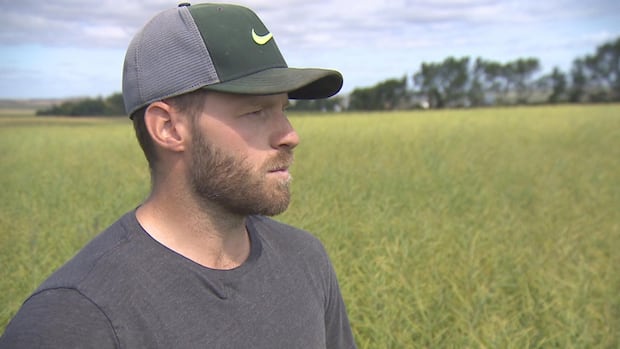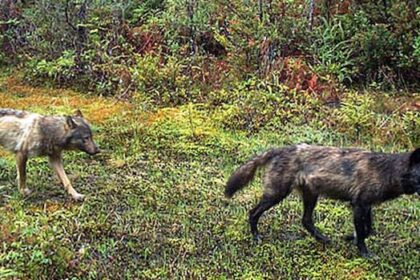SaskatchewanChina’s 75.8-per-cent tariff on Canadian canola came into effect on Thursday and farming operations across the country are already dealing with a substantial dip in the market.75.8-per-cent tariff on Canadian canola came into effect ThursdayAlex Kozroski · CBC News · Posted: Aug 18, 2025 4:00 AM EDT | Last Updated: August 18 Last crop year, Canada was the biggest exporter at about nine million tonnes out of 17 million tonnes of total trade, and China was one of the biggest buyers at about five million tonnes. (Richard Agecoutay/CBC)China’s 75.8-per-cent tariff on Canadian canola came into effect on Thursday, and farming operations across the country are already dealing with a substantial dip in the market.Codie Nagy, who grows canola on more than 800 acres north of Ogema, Sask., said tariffs could seriously affect his business.”I’ve been growing it my entire career and we haven’t dealt with this much pressure on it,” he said. “This is definitely unprecedented for me.”Codie Nagy said that recent rainfalls have given him nothing to complain about for upcoming canola harvest, but the tariffs add a lot to his stress level. (Richard Agecoutay/CBC)Nagy said he was able to pre-sell a bit of his crop but had to be careful not to overextend himself.”Essentially, we wanted to wait until we saw what type of crop we had,” he said. “How do you protect against something that you don’t know is about to happen?”Nagy said that the cost of fertilizer has doubled in recent years, while the price of canola has only increased about 20 per cent. On top of that, he said he’s dealing with sharp increases on the price of seed, machinery, insecticide and herbicide.”The cost line and the revenue line are starting to match,” Nagy said. “Obviously you’re concerned about whether you will have enough money to operate in the future.… It’s all I’ve ever done, so if you ever have the thought that crosses my mind, where maybe it’s not financially viable, of course that’s stressful.” The timing was essentially the worst for us.-Codie Nagy, canola farmer and vice-chair of SaskCanola board of directorsHe said he believes his operation is in a financially stable position right now, despite the turmoil. If the profitability of the crop continues to erode, he would consider shifting into growing more cereals or pulses.”I’m just trying to keep a positive spin on it,” Nagy said. “This just may be a blip and we can ride this out and it’s stressful, but you try not to put too much worry into it. That’s not good for me, not good for the kids, not good for the wife.”WATCH | Pierre Poilievre says Ottawa should compensate farmers hit by canola tariffs: Pierre Poilievre says Ottawa should compensate farmers hit by canola tariffsConservative Leader Pierre Poilievre says Ottawa should give farmers the money made from tariffs on Chinese electric vehicles. Derek Brewin, a professor and chair of agribusiness and agricultural economics at the University of Manitoba, said the justification for the Chinese duty is dubious.”They’re calling this an anti-dumping event and they’re paying the duty up front, and if they rule that it’s not dumping, then the duty can get returned,” Brewin said. “I’m sure it’s not any actual dumping, but you can make a trade case unfortunately from just comparing these prices.”Professor Derek Brewin is department head of agribusiness and agricultural economics at the University of Manitoba. (Alex Kozroski/CBC)According to Brewin, China is comparing Canada’s internal price of canola, which is among the lowest in the world, to external prices without factoring the cost of transport, but China’s influence on the oilseed market legitimises the threat of the duty.”China’s a large player there. In fact, they’re 60 per cent of the world trade in soybeans. So they have this great big influence on the price of oil seeds,” Brewin said. “Given that they already have that power, they’re again messing with the canola market where they’re the biggest buyer and we’re the biggest export seller.”Prime Minister Mark Carney posted on X, formerly Twitter, on Thursday, saying he spoke with Saskatchewan Premier Scott Moe on the topic. (Mark Carney/X)Brewin said that if China removes itself from the canola market, the long-term impacts would definitely be bad for crop producers in Canada, but alternative trade partners are definitely in the cards. He said the EU is starting to use canola for biofuels after previously rejecting it for food applications because it was genetically modified.”Canadians have more arable land per person than anywhere in the world except for Kazakhstan and Australia,” Brewin said. “We’ve got more crop land and more crop production than we need most of the time, so we do have to rely on trade. It’s just good to try to find a diverse group of buyers out there that helps us.”ABOUT THE AUTHORAlex Kozroski is a reporter with CBC News in Regina. He has also worked as a reporter for Golden West Broadcasting in Swift Current, Sask.
Sask. canola farmers already feeling strain of ‘anti-dumping’ Chinese tariffs











